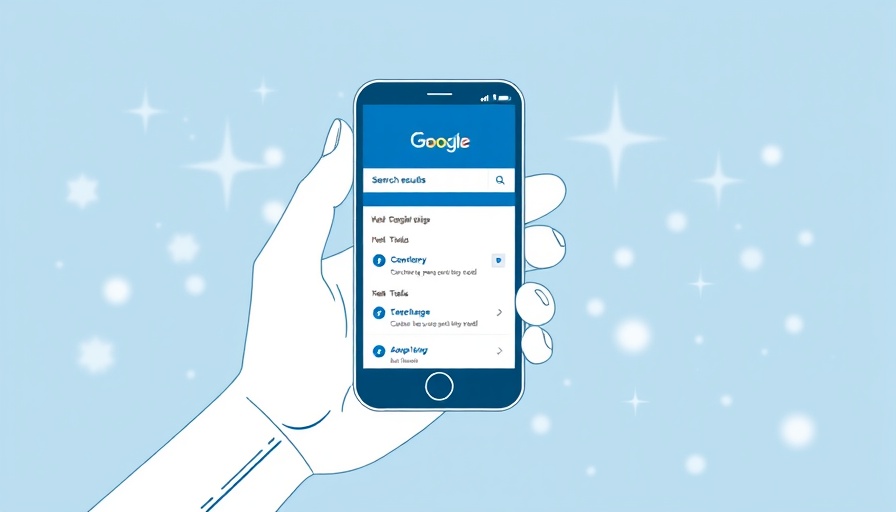
How Google AI Overviews Revolutionized Search Dynamics
The ever-evolving landscape of artificial intelligence (AI) is leaving its mark on virtually every industry, and digital marketing is no exception. Google's introduction of AI Overviews represents a pivotal shift in how users interact with search engines and seek information online. Whether you're a small business owner, a marketer, or part of an agency, understanding these changes can help you stay ahead of the competition.
What Are Google AI Overviews?
Google AI Overviews (AIOs) are AI-enhanced snippets that seamlessly integrate at the top of search engine results pages (SERPs). This innovation emerged from Google’s Search Generative Experience (SGE) initiative, launched in May 2023, which was designed to deliver immediate answers to user inquiries effortlessly. By collating information from multiple sources, AIOs provide users with concise yet comprehensive responses, allowing them to forgo navigating to various websites for answers.
A Historical Overview: From SGE to AI Overviews
The transition from SGE to AI Overviews marked a significant leap in how Google handles search queries. Initially announced at Google I/O 2023, the SGE opened for public testing shortly after. As of March 2024, AI Overviews began appearing in live Google search results, marking a departure from traditional search behaviors. During the 2024 Google I/O, the service further evolved, officially rebranding SGE into AI Overviews—a much-anticipated change in the realm of search engine optimization (SEO). This evolution implies that SEO strategies must adapt quickly to accommodate new search paradigms.
The Implications for Marketers and Small Business Owners
The most pressing concern among marketers is the potential reduction of website traffic as Google provides direct answers within search results. While AIOs enhance the user experience by answering queries instantly, they simultaneously present challenges—lessening clicks to external websites. This presents a cause for concern for business owners whose revenue strategies hinge on web traffic. As explored by Pierre DeBois in a recent analysis, adapting to these changes means shedding traditional keyword-focused approaches and embracing context-based optimization strategies.
Understanding Search Labs and AI Overviews
Search Labs represents Google’s trial ground for innovative search features. By participating, users gain early access to enhancements, including AI Overviews. This testing phase not only helps refine the service but also provides valuable insights into how AI can streamline user queries. It has led to the introduction of various features—ranging from Google Vids to Ask Photos—each enhancing the search experience. Marketers must keep abreast of these changes, as they underscore the importance of being agile in their strategies.
The Rise of AI Overviews Across Industries
Research indicates that AIOs are particularly effective in niche markets. According to SE Ranking, AI Overviews are most prevalent in sectors like Relationships (54.84%), Business (38.84%), and Food & Beverage (37.14%). The AI system is still at its infancy stage, making it imperative for businesses to optimize for this trend early on. As the AI landscape evolves, understanding the nuances of how AIOs operate can position marketers to capitalize on the emerging opportunity.
Risk Factors and Strategic Adjustments Needed
While the AI revolution promises new opportunities, it also presents challenges, particularly concerning the traditional business model rooted in organic traffic. Marketers must now consider how to balance between optimizing for AI Overviews while maintaining brand visibility on traditional search result pages. This shift may involve reevaluating content strategies to prioritize high-quality, authoritative materials that can still funnel traffic effectively, despite potential declines in clicks. Protecting and enhancing service quality in the age of AI must also remain a priority for businesses.
Conclusion: Adapting to the Future of Search
As we move through the AI era, ensuring that your marketing strategy evolves alongside technology is of utmost importance. While Google AI Overviews might appear as a formidable challenge, they also provide a unique opportunity for those willing to adapt and innovate. By embracing the changes and recalibrating strategies to align with these new dynamics, businesses can effectively harness the power of AI in improving customer engagement and satisfaction.
 Add Row
Add Row  Add
Add 




Write A Comment